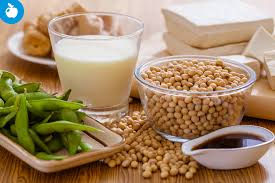
Why Women Need Flaxseed
- Mericia Anglade

- Aug 18, 2024
- 3 min read
🌿 🌿
Flaxseed is a powerful superfood that provides numerous benefits for women’s health:
1. Hormonal Balance: Flaxseed contains lignans, which can help balance hormone levels and alleviate symptoms of menopause.
2. Heart Health**: Rich in Omega-3 fatty acids, flaxseed helps reduce the risk of heart disease.
3. Digestive Health: High in dietary fiber, flaxseed promotes healthy digestion and prevents constipation.
4. Skin Health**: The antioxidants and healthy fats in flaxseed can lead to glowing skin and strong nails.
5. Weight Management: Flaxseed can help control appetite and support healthy weight loss.
Incorporate flaxseed into your daily diet to harness these incredible benefits! 🌟

Flaxseed plays a significant role in promoting hormonal balance, particularly for women, through the following mechanisms:
1. Rich in Lignans: Flaxseed is one of the richest sources of lignans, which are phytoestrogens. These compounds can mimic estrogen in the body, helping to balance hormone levels, especially during menopause when estrogen levels decline.
Phytoestrogens found in flaxseed can help balance estrogen levels in the body. This is particularly important for women trying to conceive, as hormonal balance is crucial for ovulation and reproductive health.
2. Supports Estrogen Metabolism: Lignans can help modulate estrogen metabolism, potentially reducing the risk of estrogen-related conditions, such as breast cancer. They promote the production of beneficial estrogen metabolites while inhibiting harmful forms.
3. Omega-3 Fatty Acids: Flaxseed is high in alpha-linolenic acid (ALA), an omega-3 fatty acid that can help reduce inflammation in the body and support overall hormonal health.
4. Regulates Menstrual Cycle: The fiber in flaxseed can aid in regulating the menstrual cycle by promoting healthy digestion and hormone elimination, which may alleviate symptoms of PMS.
5. Insulin Sensitivity: The soluble fiber in flaxseed can improve insulin sensitivity, which is crucial for balancing hormones involved in metabolism and energy regulation.
Flaxseed may help improve insulin sensitivity, which is beneficial for women with polycystic ovary syndrome (PCOS). PCOS can affect ovulation and fertility, and managing insulin levels can help improve reproductive outcomes.
Incorporating flaxseed into the diet can support hormonal balance, particularly during significant hormonal changes, and contribute to overall reproductive health.

Flaxseed is a nutrient-dense food that contains various vitamins and minerals beneficial for health. Here are some of the key nutrients found in flaxseed:
Vitamins:
1. Vitamin B1 (Thiamine): Important for energy metabolism and nerve function.
2. Vitamin B6: Supports brain health and helps in the production of neurotransmitters.
3. Folate (Vitamin B9): Essential for DNA synthesis and repair, and important during pregnancy.
Flaxseed is high in essential vitamins and minerals, such as B vitamins, magnesium, and zinc, which play important roles in reproductive health and hormone production.
Minerals:
1. Magnesium: Aids in muscle function, energy production, and bone health.
2. Phosphorus: Important for bone health and energy production.
3. Potassium: Helps regulate fluid balance, muscle contractions, and nerve signals.
4. Calcium: Essential for bone health and muscle function.
5. Iron: Crucial for the production of red blood cells and oxygen transport in the body.
Additional Nutrients:
-Omega-3 Fatty Acids: Flaxseed is one of the best plant sources of alpha-linolenic acid (ALA), an essential fatty acid that supports heart health.
- Fiber: High in both soluble and insoluble fiber, promoting digestive health.
Incorporating flaxseed into your diet can provide these essential vitamins and minerals, contributing to overall health and wellness.
Flaxseed may have positive effects on fertility, particularly for women, due to its rich nutritional profile and hormonal-balancing properties.
While flaxseed can be a beneficial addition to a fertility-supportive diet, it's important for individuals to consult with healthcare professionals for personalized advice and recommendations when trying to conceive.



Comments